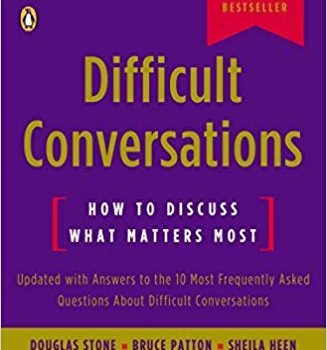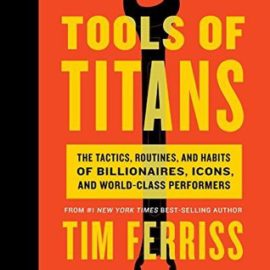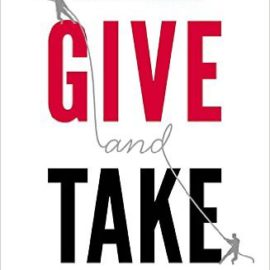
Want to learn the ideas in Difficult Conversations better than ever? Read the world’s #1 book summary of Difficult Conversations by Douglas Stone, Bruce Patton, Sheila Heen here.
Read a brief 1-Page Summary or watch video summaries curated by our expert team. Note: this book guide is not affiliated with or endorsed by the publisher or author, and we always encourage you to purchase and read the full book.
Video Summaries of Difficult Conversations
We’ve scoured the Internet for the very best videos on Difficult Conversations, from high-quality videos summaries to interviews or commentary by Douglas Stone, Bruce Patton, Sheila Heen.
1-Page Summary of Difficult Conversations
Overview
Some people are great at communicating with others, while some aren’t. Some conversations can be difficult to have, so it’s important to learn how to handle them. The authors compiled this guide by highlighting the common pitfalls that ruin uncomfortable conversations and providing advice on how to stop them from happening. It also provides a framework for keeping these types of conversations focused and free of hurt feelings.
After reading this book, you will be able to handle any difficult conversation with ease.
In this article, you will learn about the “What Happened?” conversation, what an emotional footprint is and how to confront a flatmate about dirty dishes.
Big Idea #1: You shouldn’t avoid difficult conversations out of fear of the consequences.
Communication is key to most things in life. However, some conversations are more difficult than others. A difficult conversation is any topic that makes you feel uncomfortable and challenges your beliefs or values. Common topics include religion, politics, race, gender issues and smoking—but it can extend beyond these topics as well.
It’s often hard to approach a difficult conversation because the outcome is unpredictable and there are high stakes involved, which leaves you vulnerable. Your mind jumps back and forth between trying to decide whether or not you should confront the situation. If you do, it could improve but there’s also a chance that things will get worse.
If you complain to your neighbor about his dog, he may be very understanding and keep the dog inside at night. However, he might also think you’re overreacting and hold a grudge against you for complaining.
It is important to always take part in a conversation, even if it’s difficult. Difficult conversations are not ideal, but neither are dogs barking at night. More often than not, these talks are worth the effort if they could improve your life. So don’t ignore something that bugs you and instead learn how to speak up in an effective manner with the following key points.
Big Idea #2: Difficult conversations comprise of blame, feelings and identity.
Any difficult discussion consists of three elements happening at the same time: a conversation about what happened, an emotional conversation and an identity conversation.
In a “What Happened?” conversation, two people fight over who’s right and who’s wrong. They may end up blaming each other for what happened. However, the person on the receiving end of that blame might be able to say something similar about the accuser!
It’s easy to blame people for things they didn’t do. Instead of saying, “I’m upset because you flushed my cigarettes down the toilet,” say, “I’m angry that you threw away my cigarettes.” It’s also easy to take other people’s actions personally and assume that they’re doing it on purpose. For example, if someone is late for work, instead of blaming them by saying, “It was your fault I was late for work today,” point out how their actions affected you: “Because I had to stop at the store after work to get a new packet of cigarettes.” The next thing we often accuse others of is feeling bad about themselves. We may feel guilty when we realize we’ve said something hurtful or rude about another person and want to make sure they know it wasn’t their fault; therefore, we tell them how much better than us they are in an attempt to assuage our guilt.
Conversations are difficult because they involve emotions. We get frustrated and angry, hurt and disappointed in others. Perhaps you feel disrespected by a colleague or vice versa.
The third type of conversation is about our identity. When you’re confronting a neighbor, and they see that as aggressive behavior, it could change their opinion of who you are. That’s why we may avoid confrontation to maintain our image.






